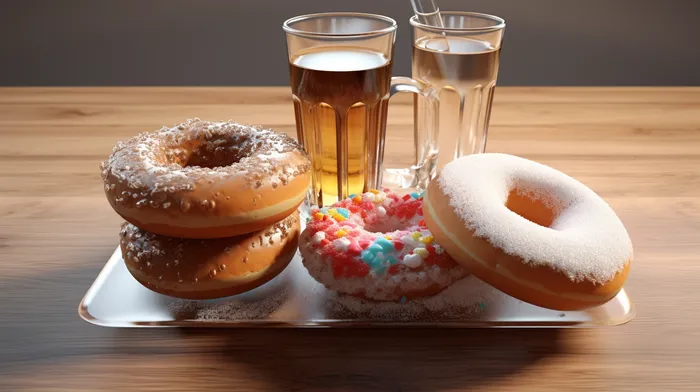Do you crave something sweet from time to time, like many others? While it’s entirely normal to have the occasional sugar craving, being mindful of your sugar consumption is essential, especially for women. Why? A study from Canada reveals that consuming one particular sweet treat every other day can significantly increase the risk of breast cancer in women.
High Fructose Corn Syrup: The Biggest Culprit
The primary danger lies in soft drinks sweetened with high fructose corn syrup (HFCS). This study demonstrates that drinking just a few HFCS-sweetened beverages per week is linked to higher breast density among younger women. What does higher breast density mean for you? It means a higher chance of developing breast cancer.
For older women, the research uncovers that sweet foods such as donuts, cakes, and cookies are associated with dangerously dense breast tissue.
The relationship between breast density and breast cancer is made clear when the researchers explain, “Breast cancer generally arises in epithelial cells, and an increase in overall epithelial cell number is believed to increase the risk of breast cancer. Therefore, as breast density increases, so does the risk of developing breast cancer.”
The Scary Reality of Sugar Consumption
Here’s a sobering truth: the average American consumes approximately 40 pounds of sugar every year! That’s more than one-tenth of a pound every single day, and this excessive sweetness in their lives is leading to bitter health outcomes.

Now before you panic and decide to go cold turkey on sugar, it’s crucial to note that not all sugars are created equal.
The Different Types of Sugars
Natural sugar occurs in whole foods like fruits, vegetables, and dairy products. Consuming these foods is usually not a cause for concern since they are filled with essential vitamins, minerals, and nutrients that fuel our bodies.
On the other hand, added sugars are to blame. Added sugars refer to any sugars or sweeteners (in any form) that are added to processed and prepared foods during the manufacturing process or preparation. These added sugars are the ones that are wreaking havoc on people’s health and causing a variety of chronic diseases.
How to Limit Your Sugar Intake
Now that you know the dangers lurking behind a sugary diet, how can you limit your sugar intake? Here are a few helpful tips:
- Stay away from sodas and sugary drinks: As previously mentioned, soft drinks sweetened with HFCS pose a significant risk to your health. Opt for water, herbal tea, or fresh fruit-infused water instead.
-
Be cautious of hidden sugars: Did you know that sugar is a common ingredient in many food items, even the ones that don’t taste sweet? Products like salad dressings, marinades, and sauces often contain added sugar. Make it a habit of reading food labels to check for hidden sugars before making a purchase.
-
Opt for whole, unprocessed foods: By incorporating more whole foods like fruits, vegetables, lean proteins, and whole grains into your diet, you’ll naturally keep your sugar intake to a minimum.
-
Learn healthier ways to satisfy your sweet tooth: When the craving for something sweet hits, find healthier, low-sugar options. Some tasty alternatives include dark chocolate, fruits, or natural sweeteners like honey or maple syrup in moderation.
Breast Cancer Prevention: It’s Not Just About Sugar
Although limiting sugar intake is crucial to reduce the risk of breast cancer, other factors shouldn’t be ignored. Maintaining a healthy lifestyle by eating a balanced diet, getting regular exercise, and managing stress are all essential components of overall health and cancer prevention.
Moreover, make sure to engage in regular breast self-exams and schedule yearly clinical exams to stay ahead of any potential issues. The earlier the detection, the greater the chances of successful treatment.
In conclusion, while an occasional treat is enjoyable, it’s vital to be aware of the dangers of excess sugar in your diet, especially for women. By making smarter dietary choices and adopting a healthy lifestyle, you can take charge of your wellbeing and significantly reduce your risk of breast cancer.



